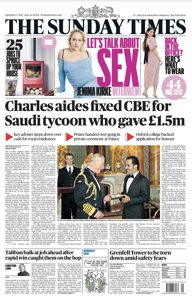
Charles Cash for Honours
The Sunday Times
Some of that difficulty is inevitable: many argue that for constitutional monarchy to work, MPs shouldn’t be able to debate its future; royals should be exempt from transparency laws; a part-public, part-private family shouldn't have to volunteer information about its finances. But the reality this creates is one in which journalists are the only people capable of examining an institution which still matters: still exercises power; still wields influence; still sits at the apex of society; still helps define who is acceptable in our society. Despite the obstacles, Gabriel has produced a series of agenda-setting scoops on the royals. If partygate centred on lawbreaking in No10, but also the indifference of the civil service, police, and Conservatives (i.e. the establishment), our work represented something similar in the court of King Charles. To date, Gabriel’s work has played a pivotal role in the resignations of the chairman, CEO and director of the Prince’s Foundation, and the instigation of criminal and statutory investigations by the Metropolitan Police, the Charity Commission and the OSCR. The police probe is unprecedented for the royals, embroiling the King in an investigation into breaches of laws written and enforced in the name of the Crown. Gabriel has also lifted the veil on practices which, while not illegal, fell below the conduct expected of the monarchy. Cash in suitcases. €500 notes into Fortnum & Mason bags. The king promising access to a Russian convict. Such scoops were reported globally. If a theme unites Gabriel’s work, the world where money, royalty and politics meet. Our series started with a story about Tory chairman Ben Elliot selling access to Charles. In response, sources approached us saying we’d only scratched the surface of the “cash-for-access” culture. We soon learned royal aides sold an honour to a Saudi who donated millions to Charles's estate on the basis he would develop a “special friendship” with the then prince and receive a CBE, which he was given by Charles in a secret ceremony. Notwithstanding some teething issues - we refused to pay one source who subsequently approached a rival publication - at 6pm on 4 September, we broke the story - and news that Fawcett had temporarily stepped down. He quit after an inquiry bore out our report. The evidence we produced in the period that followed included letters from Fawcett promising support for the Saudi and minutes from a Clarence House meeting where the honour was discussed. We published pictures of the ceremony and emails showing the CBE was offered in exchange for cash, and revealed Charles met the Saudi in three counties. Harry surfaced to say he warned his father not to get involved with the man. Police formally reviewed our evidence and after months of prevarication launched an investigation. The news days after Charles’s accession that detectives had interviewed suspects was a fitting capstone - showing that even the king isn't beyond the reach of investigative journalism, scrutiny and its consequences.